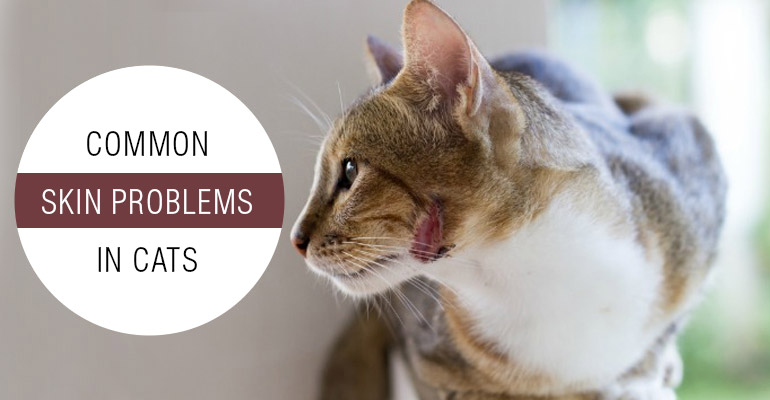If your cat sitting on that porch is constantly scratching, licking or rubbing against the hard furniture, then the culprit for this condition of your feline friend is the skin problem. Being cat skin quite sensitive, they are highly susceptible to allergies, skin infections, parasites and many other conditions that pave the way to skin conditions. To help you figure out the most common skin problems in cats and how well you can treat them as well as how to protect your kitty from these health conditions, here we go.
What are the most common skin problems in cats?
-
Bacterial Infections
Normally, a bacterial infection is the result of other skin problems. For e.g., a rash when left untreated can gradually lead to bacterial infections, which when becomes severe is quite difficult to tackle. Antibiotics usually work best and are given for treating these infections. However, it is quite important to find that underlying skin problem in order to control the recurrence or further deterioration.
-
Feline Acne
ACNE – it is not only your date night disaster, but cats do also suffer from this. They primarily get these pimples on and around their chin. And, the most common causes for pimples to appear on felines are stress, a reaction to a medication, poor grooming and underlying skin condition, or it can even be the plastic bowl that you put out for her food or water.
-
Yeast Infections
Cat ear is the most common spot that suffers from yeast infection. Normally, this is caused by a fungus and is also more likely in cats that have a medical history of other skin problems. Yellow discharge, redness of the ear flap and persistent ear scratching are some of the common signs of yeast infection. It can be treated well with antifungal medication such as Epi-otic Ear Cleaner for cats. However, it is always a wise choice to refer to your veterinarian before giving any oral medicine.
-
Ringworm
Ringworm affects cats especially under the age of 1. It is yet another type of fungus that may cause circular lesions on a cat’s ears, head, and forelimbs as well as any other part of the body. Being contagious and zoonotic by nature, ringworm can spread to other pets in the home as well as humans. Treatment depends on severity but there can be specialized shampoos, ointments or oral medications available for this skin problem.
-
Allergic Dermatitis
Allergies can be caused due to various reasons. Cats may succumb to reactions to grooming products, food and environmental irritants like pollen or flea bites. Some of the common symptoms of food allergies are scratching the head or neck whereas the symptoms of other allergies include scratching the back of the ears or chewing the back of the tail. Allergies can also cause hair loss or skin lesion anywhere on the body, including the belly. There are a variety of treatments and supplements that treat this itchy skin problem in cats. However, avoiding exposure to allergens can be the best idea.
-
Hair Loss
With cat living with you, it is natural for you to deal with hair everywhere in the house. But, the real shock comes when you find that your cat is losing hair unusually with baldness or small batches without hair everywhere or at specific places.
-
Fleas
If you think that fleas would not affect your cat’s skin condition, then be ready to break your own myth. These tiny critters instigate persistent scratching, crusty lesions, and red rashes. To remove that you need to provide flea treatments for your cat. Furthermore, in order to control future flea infestations, it is crucial that you need to keep her on monthly flea preventives as well as treat her bedding, furniture, and rugs. In case, you have other pets in your house, it is crucial that you treat them also to completely protect against flea infestations.
-
Ear Mites
Apart from fleas, the other parasite that usually attacks cats is ear mites. These tiny parasites mostly depend on wax and oil inside a cat’s ear. Feeding on these things, they cause inflammation, which can gradually lead to severe skin as well as ear infections. Due to the presence of ear mites, cats can continuously scratch the ears, shake head and at times, this can even result in a dark discharge from the ears and bad odor. If you suspect ear mites, it is crucial to treat your cat for the same because ear mites not only deteriorate the skin condition of your furry pal but are also contagious and can spread to other animals.
Skin problems in cats can be effectively handled and treated if you take care of your kitty. Proper grooming, nourishment, healthy diet, monthly flea, and ear mite treatments along with skin care supplements can profusely aid in keeping your cat’s skin healthy and glowing.
